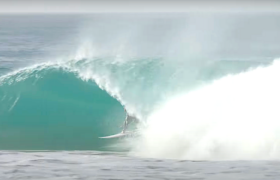"It's very frustrating to be excluded from representing my home country... simply because of my religious identity."
In a turbo-charged example of France’s secular laws, or Laïcité as they call it, French Olympic officials have banned all explicit religious symbols from the Paris 2024 Games.
And, in the case of Brazil’s João Chianca, one of the gold medal favourites at Teahupoo, he’s been told to remove his Christ the Redeemer graphic from his quiver of Channel Islands shooters.
“I just received the news that painting is not authorized at the Olympic Games because Christ is a religious figure,” said Chianca. “And the games have strict rules and focus on total neutrality.”
View this post on Instagram
French secularism has real long roots stretching back to the French Revolution of 1789 when the Declaration of the Rights of Man and Citizen proclaimed the freedom of religious opinion.
A couple of hundred years later, the Law on the Separation of the Churches and State was passed, establishing the separation of church and state in France. This law has been real important in French society ever since, ensuring that the state remains neutral in matters of religion.
It means no crucifix necklaces in school and, theoretically at least, no gals in hijabs strolling into classrooms. Obviously, it’s a pretty paper thin rule.
A little aside: my kids were educated in the French system and one of ‘em had to cover his skate tee which featured a cross. But, then, one of the sub teachers got around in a pretty LVT hijab.
Go figure, as they say.
The ban has hit one of France’s star basketball players, French Muslim Diaba Konate told she couldn’t wear her hijab during the Games.
“Despite my desire and skills, I’m… not actually allowed to play for France because of discriminatory policies,” the 24-year-old told France24.
“It’s very frustrating to be excluded from representing my home country… simply because of my religious identity,” said the athlete who has played on France’s national youth team and has a career in college basketball in the United States. I strongly believe that sports should be inclusive.”
The surfing takes place over four days in a 10-day window, from 27 July to 5 August.








